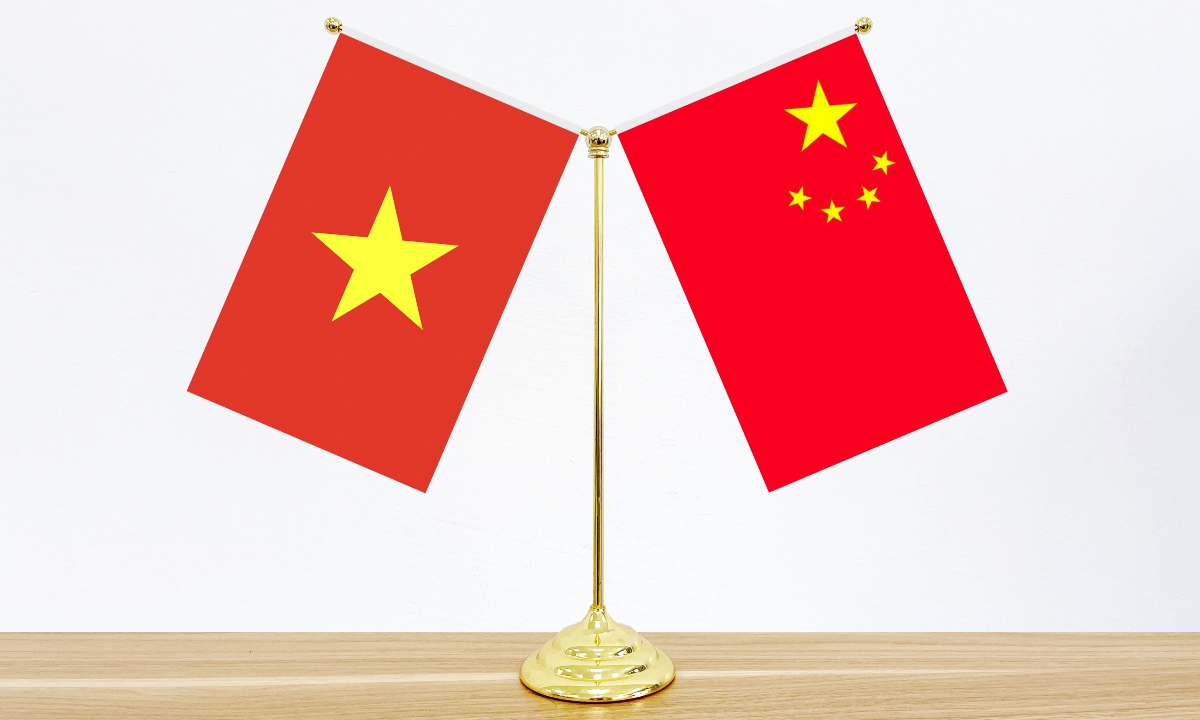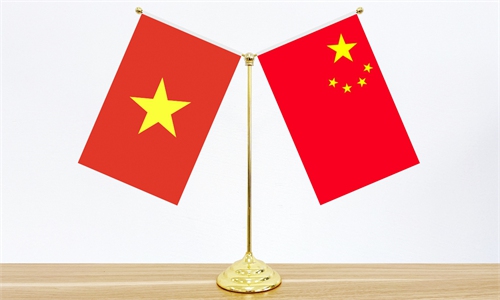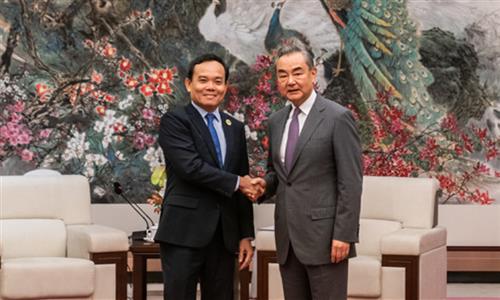
China Vietnam Photo: VCG
Top Chinese diplomat Wang Yi on Friday met with General Secretary of the Communist Party of Vietnam Central Committee Nguyen Phu Trong in Hanoi during a two-day visit as part of frequent bilateral interactions.
Wang, Member of the Political Bureau of the Communist Party of China Central Committee and Foreign Minister, said that China and Vietnam share the same aspiration and destiny, which is the most distinctive feature of bilateral relations. China appreciates that Vietnam consistently regards its relationship with China as a strategic choice and top priority in its foreign policy, and China also considers its relationship with Vietnam as a priority in its neighboring diplomacy.
On the basis of 15 years of the comprehensive strategic cooperative partnership between the two countries, it came about naturally that the two sides reached a consensus on upgrading bilateral relations. This is in line with the common aspirations and interests of both countries, and also conducive to regional and global peace and development, opening up a brighter future for bilateral relations, Wang said.
Wang on Friday also co-chaired the 15th Meeting of the China-Vietnam Steering Committee for Bilateral Cooperation with Vietnamese Deputy Prime Minister Tran Luu Quang. The two reached a series of consensus on promoting cooperation in various fields in the next stage.
According to Voice of Vietnam, the two sides agreed to enhance the efficiency of economic, trade, and investment cooperation; promote traffic connections, especially in the fields of railways, roads, and border gate infrastructure; and improve customs clearance efficiency to maintain smooth trade, and ensure production and supply chains.
Gu Xiaosong, dean of the ASEAN Research Institute at the Hainan Tropical Ocean University, told the Global Times on Friday that China and Vietnam, both socialist countries led by Communist parties, have maintained close political, economic and cultural exchanges.
Nguyen was the first foreign leader to visit China after the 20th National Congress of the CPC in October 2022.
Observers expect the visit by Wang to consolidate bilateral consensus and pave the way for the two countries to further develop bilateral relations and yield substantial, mutually beneficial fruits.
Steady cooperation
Pan Jin'e, research fellow with the Chinese Academy of Social Sciences, told the Global Times on Friday that the mature mutual-visit mechanisms between China and Vietnam, after being disrupted during the pandemic, have gradually returned to pre-pandemic levels.
Since the China visit by Nguyen in October 2022, China and Vietnam have maintained close and frequent meetings at various levels.
Vietnamese Prime Minister Pham Minh Chinh visited China in June 2023 at the invitation of Chinese Premier Li Qiang. The two also had a warm dialogue on the sidelines of the ASEAN summit in September.
Tran visited China in August to attend the 7th China-South Asia Expo where he met with Wang Yi. The two sides agreed to continue to leverage the cooperative mechanisms, coordinate efforts to advance collaboration in various fields, and propel the bilateral relationship toward the goal of building a community with a shared future between the two countries.
The Chinese and Vietnamese navies concluded the 35th joint patrol in the Beibu Gulf recently, China Military Online reported Wednesday. After the joint patrol, the two sides conducted joint drills on search and rescue, communication, among other fields.
Chinese Minister of Commerce Wang Wentao and Pham met in late November in Ho Chi Minh City and exchanged views on subjects such as trade settlement in local currencies and railway connectivity.
Pan saw concrete cooperation programs as substantial progress made following agreements in principle made between the two countries last year.
Observers also agreed on the potential of bilateral trade, which has already made notable achievements. China is Vietnam's largest trading partner, with bilateral trade hitting $234.9 billion in 2022. Vietnam has become China's biggest trading partner among the 10 ASEAN members, the Xinhua News Agency reported.
Gu predicted that more quality agricultural products will be able to enter the Chinese market and the two countries also have great potential to cooperate on infrastructure.
Infrastructure is a bottleneck for Vietnam's economic growth. It is in need of better railway connectivity, while China has technological and financial advantages, Gu said, adding that the success of the China-Laos Railway has been a stimulus for Vietnam to enhance railway cooperation with China.
Ge Hongliang, deputy director of the College of ASEAN Studies at Guangxi University for Nationalities, added that China and Vietnam can also jointly ensure the stability of supply chains and boost regional economy.
Analysts refuted narratives that sowed discord between China and Vietnam, claiming they are competing on supply chains amid industrial transfers. "The trend is a natural industrial upgrade and results of market principles. Indeed many Chinese companies are investing in Vietnam," Ge said.
In the first half of 2023, China poured nearly $1.3 billion into 233 projects in Vietnam, becoming the third largest foreign direct Investment (FDI) source country after Singapore and Japan. Currently, China is in sixth position out of 143 countries and regions investing in Vietnam with 3,791 valid projects valued at more than $25 billion, VOV reported Friday.
Managing divergences
As for the hype by some Western media that Vietnam is shifting away from China, given Hanoi's upgrade of relations with Washington and Tokyo to "comprehensive strategic partnership," observers said this is an exaggeration of China-Vietnam differences and a trick aimed at luring Vietnam to contain China, or at least an attempt to depict it.
Vietnam has the realistic need to maintain a diverse and autonomous diplomacy, properly handle ties with major powers and neighboring countries, particularly against the backdrop of complexity and uncertainty in geopolitics and globalization, according to experts.
A true risk point between China and Vietnam lies in the disputes over the South China Sea, which is also casting a shadow over regional security and stability, Ge said, citing Vietnam's accelerating expansion of construction and intention to complicate the South China Sea issue by making it an international one.
But analysts agreed that so far, the two countries have been successful in restricting the scale of disputes, preventing them from impacting the big picture of bilateral relations.
The territorial dispute may take a very long time to resolve, so it is important to manage it well at present, preventing the divergence from widening and countries outside the region, like the US, from exploiting it, Gu said.
Ge described the territorial disputes as an "undercurrent," which has not yet posed a major challenge to the situation in the South China Sea or to bilateral relations.
The pattern of inter-party relations guiding the development of bilateral relations, including managing differences and promoting cooperation, is quite significant, the expert said.


